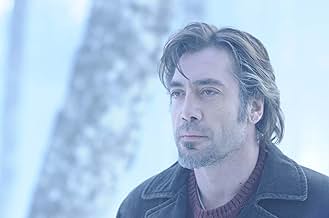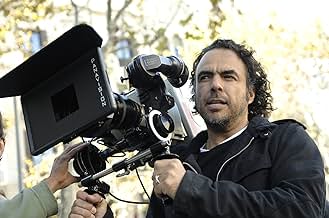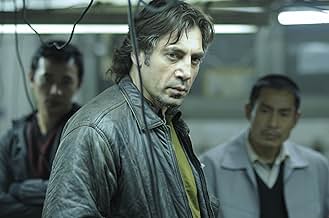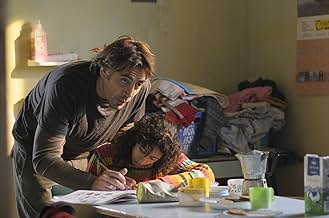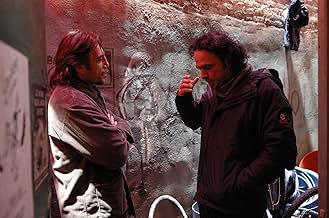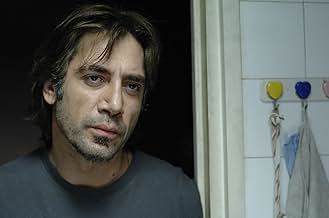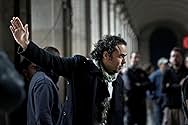A man dying of cancer tries his best to leave the world on his own terms.A man dying of cancer tries his best to leave the world on his own terms.A man dying of cancer tries his best to leave the world on his own terms.
- Nominated for 2 Oscars
- 21 wins & 65 nominations total
Taishen Cheng
- Hai
- (as Taisheng Cheng)
Storyline
Did you know
- TriviaJavier Bardem's part in this film is the first time that a performance entirely in the Spanish Language has been nominated for an Academy Award Best Actor Oscar.
- GoofsIn the scene where there are three dead boys lying, the hands of the middle boy changes in between shots.
- Crazy creditsDedication shown before ending credits: "To my beautiful old oak...Héctor González Gama, my father"
- ConnectionsFeatured in The Tonight Show with Jay Leno: Episode #19.61 (2010)
- SoundtracksComo te extraño mi amor
Performed by Café Tacvba
Written by Leo Dan (as Leopoldo Dante Tévez)
Courtesy of Warner Music México, S.A. De C.V.
Publishing Emi Music Publishing
Featured review
Inarritu's three previous films---Amores Perros, 21 Grams and Babel---are classified together as the Death Trilogy, as they each depict the exponential impact of fatal or near-fatal occurrences in the interconnected existence of separate lives. They are each epic, punch-packing dramatic powerhouses. But now I see he still had much more to say on the literally infinite subject of death. And he says it with Biutiful, a purely experiential film that pierces through the heart with the acuity of a stingray barb.
The narrative here is a rail tunnel of raw, sprawling intimacy set in an overpopulated, decaying Barcelona ghetto. We follow Uxbal, and we're not entirely sure what he does. Neither does anybody, or him really. Much of the things he does are criminal, mainly mitigating between corrupt police and illegal aliens, with often catastrophic results. He is also a dedicated father to two young children whose mother, his ex-wife, is a wreck of alcohol, bipolarity and promiscuity, and worse, knows her inability to control herself and is in a quicksand of bettering herself. Uxbal also has prostate cancer, which is rapidly spreading. Also, he is internally connected with the afterlife. He doesn't see visions, he doesn't clutch shoulders and see the manner of one's impending death. He purely senses a recently deceased spirit in the room with him. He can do nothing about their situation. He just senses them.
Uxbal's ability to feel the presence of departed souls is portrayed like a sort of capacity to hear noise at the volume at which, say, a dog could only be expected to hear it. The film's setting and happenings are a jerky, spontaneous, lateral rush of urban business, like the sight, sound and fury made by the living to distract themselves from the silence of death. Each scene seems to be a concordance of extroverted behavior and internal behavior, both with equal fervor, yet both on either side of some two-way mirror. Only those characters, namely Uxbal, whose conflicts and dilemmas are constantly internalized, can hear that silence. Eventually, his daughter does as well, and becomes the closest to him, in what one might go as far as to consider the film's climax, a bear-like hug they both know is as fleeting as every other action in this desperate commotion of a life they lead.
Iñárritu intends to drain us. Physically, internally, emotionally. And he cleans out his total cinematic armory to do so. And like death, that is both a blessing and a curse. For however harrowing it is, Biutiful exalts us with the chance to see soul bare, through Javier Bardem's performance as Uxbal. Watching Bardem absorb, involve and ultimately possess a many-sided role like Uxbal's is a singular delicacy, and a complete wonder. His eyes speak agonizing tomes. He hauls from an unfathomably mysterious spring of passion, grief, and who knows what else.
One might be able to delineate that Bardem renders a tragic individual as a fading Barcelona forager who deals in illegal immigrants and connects with the deceased. But every now and then, a story materializes, conveyed in a way that is so sprawling, so comprehensive, that no one premise or implication can classify it. Attempting to definitely describe it limits something that offers the utmost magnitude of whatever an actor's, a filmmaker's, and viewer's, understanding. That is what makes Biutiful so precious.
The narrative here is a rail tunnel of raw, sprawling intimacy set in an overpopulated, decaying Barcelona ghetto. We follow Uxbal, and we're not entirely sure what he does. Neither does anybody, or him really. Much of the things he does are criminal, mainly mitigating between corrupt police and illegal aliens, with often catastrophic results. He is also a dedicated father to two young children whose mother, his ex-wife, is a wreck of alcohol, bipolarity and promiscuity, and worse, knows her inability to control herself and is in a quicksand of bettering herself. Uxbal also has prostate cancer, which is rapidly spreading. Also, he is internally connected with the afterlife. He doesn't see visions, he doesn't clutch shoulders and see the manner of one's impending death. He purely senses a recently deceased spirit in the room with him. He can do nothing about their situation. He just senses them.
Uxbal's ability to feel the presence of departed souls is portrayed like a sort of capacity to hear noise at the volume at which, say, a dog could only be expected to hear it. The film's setting and happenings are a jerky, spontaneous, lateral rush of urban business, like the sight, sound and fury made by the living to distract themselves from the silence of death. Each scene seems to be a concordance of extroverted behavior and internal behavior, both with equal fervor, yet both on either side of some two-way mirror. Only those characters, namely Uxbal, whose conflicts and dilemmas are constantly internalized, can hear that silence. Eventually, his daughter does as well, and becomes the closest to him, in what one might go as far as to consider the film's climax, a bear-like hug they both know is as fleeting as every other action in this desperate commotion of a life they lead.
Iñárritu intends to drain us. Physically, internally, emotionally. And he cleans out his total cinematic armory to do so. And like death, that is both a blessing and a curse. For however harrowing it is, Biutiful exalts us with the chance to see soul bare, through Javier Bardem's performance as Uxbal. Watching Bardem absorb, involve and ultimately possess a many-sided role like Uxbal's is a singular delicacy, and a complete wonder. His eyes speak agonizing tomes. He hauls from an unfathomably mysterious spring of passion, grief, and who knows what else.
One might be able to delineate that Bardem renders a tragic individual as a fading Barcelona forager who deals in illegal immigrants and connects with the deceased. But every now and then, a story materializes, conveyed in a way that is so sprawling, so comprehensive, that no one premise or implication can classify it. Attempting to definitely describe it limits something that offers the utmost magnitude of whatever an actor's, a filmmaker's, and viewer's, understanding. That is what makes Biutiful so precious.
- How long is Biutiful?Powered by Alexa
Details
- Release date
- Countries of origin
- Official sites
- Languages
- Also known as
- Những Giây Phút Cuối
- Filming locations
- Production companies
- See more company credits at IMDbPro
Box office
- Gross US & Canada
- $5,101,237
- Opening weekend US & Canada
- $457,206
- Jan 30, 2011
- Gross worldwide
- $25,147,786
- Runtime2 hours 28 minutes
- Color
- Sound mix
- Aspect ratio
- 2.35 : 1
Contribute to this page
Suggest an edit or add missing content


![Watch Tráiler [OV]](https://m.media-amazon.com/images/M/MV5BZjNkYzhlODMtNjc2YS00ZDAwLWIyMGUtNmNhOTY3N2VhMDU1XkEyXkFqcGdeQXRodW1ibmFpbC1pbml0aWFsaXplcg@@._V1_QL75_UX500_CR0)


